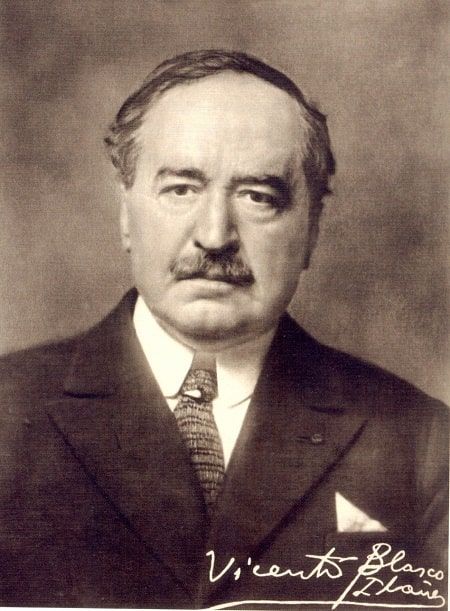Revealing Spanish writer and journalist Vicente Blasco Ibáñez
Vicente Blasco Ibáñez, Spanish writer, journalist and politician. Author of more than forty novels, including "Los cuatro jinetes del Apocalipsis", "Sangre y arena", novels made into movies with renowned actors.

Vicente Blasco Ibáñez (Valencia 1867 - Menton, France 1928) was an uncomfortable character for the power. Politician, journalist, writer... he spoke out openly against the conservative policies of the monarchist Alfonsinos and the church. His political stances earned him allies and great enemies.
He graduated in Law in 1888, although he never practiced. He joined the Freemasonry a year earlier, under the name of Danton. He attended the meetings of the Federal Republican Party. In his public interventions, he discovered that he was gifted for oratory, with a great capacity for persuasion. Blasco Ibáñez confronted the reality of Valencia, a region that in those years suffered precarious living conditions and illiteracy, denouncing abuses against the poor.
When the Carlist pretender, the Marquis of Cerralbo, visited Valencia in 1890, he made a call from the newspaper "La Bandera Federal" to boycott him. Blasco Ibáñez was accused of insulting the public authorities. He had to flee dressed as a fisherman: he hid in some villages before going to Paris, where he spent the winter of 1891. His journalistic period begins.
From his return until 1905 he devoted himself entirely to politics. He will be the most popular politician in Valencia, the most feared for his ability to summon the masses. A Carlist deputy will cry out: "In Valencia, one cannot go out on the streets without the permission of Mr. Blasco Ibáñez and his friends". Blasco Ibáñez's activity was centered on his opposition to the monarchy and his republican ideals. In 1894 he founded the newspaper El Pueblo, where he published close to a thousand articles and countless gazettes or unsigned chronicles. The popular classes recognized and identified with the medium.
A political movement called "blasquismo" was created around his figure: it advocated republicanism, anticlericalism, and economic reform through the distribution of property (the antecedents are found in the sans-culottes of the French Revolution: popular sovereignty is not delegated, it is exercised). He was persecuted by the courts and imprisoned on several occasions for demonstrating against the church and the monarchy.
During the years of political activism he wrote his best known novels: Arroz y tartana (1894), Flor de mayo (1895), La barraca (1898), Entre naranjos (1900), Cañas y barro (1902), La catedral (1903), El intruso (1904), La bodega (1905), La horda (1906)... In 1908 he abandoned politics to focus on literature. He moved to Madrid, where he had an intense relationship with other writers and artists. That year he published Sangre y Arena, one of his most internationally successful novels.
After the strange project of colonizing Patagonia with Valencian farmers, which ruined him, Blasco Ibáñez decided to become an international writer, manufacturer of best-sellers. He went to Paris and when the First World War broke out in the summer of 1914, he saw the opportunity to place great reports in the press. He began to publish in his Valencian publishing house a "History of the European War" in booklets.
He visits the fronts and the rearguard, adopting a point of view favorable to the Allies. At the same time, he began to write the novel that would make him world-famous and definitively rich: "The Four Horsemen of the Apocalypse". This was followed by the novel "Mare Nostrum" (1918), and "The Enemies of Women" (1919), which completed the trilogy on the "Great War".
She returned to political life to fight against the dictatorship of Primo de Rivera (1923-1928). At the tomb of Emile Zola, he pronounced some beautiful words: "He was born in a time when it was necessary to defend freedom and truth, and he defended them by offering welfare, fame, and life... no man who can have an echo in Spain and the whole world is allowed to remain silent at this time".
Blasco Ibáñez later published "Una nación secuestrada", where he harshly attacks the dictatorship of General Primo de Rivera, a text of great repercussion, extended after Primo de Rivera's denunciation for alleged insults to the king. The writer also resigned from the Academy. The press, as a whole in the hands of the right-wing of the time, began a harsh denigrating campaign against the politician and writer.
Just as he was beginning a new novel, an account of his life, " La juventud del mundo" ("The Youth of the World"), he died of pneumonia at his Fontana Rosa residence, in Menton (France), on January 28, 1928, one day before his 61st birthday. His remains were transferred to Valencia after the proclamation of the Second Republic.
Blasco Ibáñez was a politician and a cursed writer for the dictatorships of the 20th century. They did not want his work and his political activism to be known, because of his republicanism and anticlericalism. His enormous international prestige bothered the powers that be: they sought to discredit him with lies and falsehoods, to make him "disappear". Blasco Ibáñez's work is currently unknown, or little known and poorly known.
By Pablo Torres




